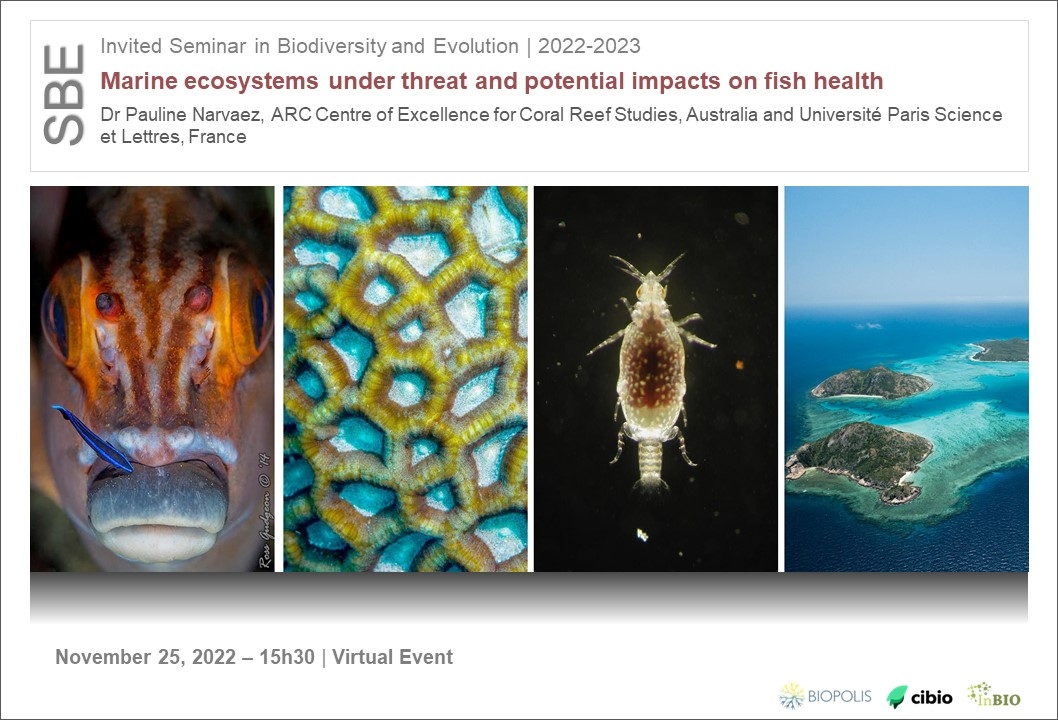Marine ecosystems under threat and potential impacts on fish health
25 Nov 2022 - Dr Pauline Narvaez, ARC Centre of Excellence for Coral Reef Studies, Australia and Université Paris Science et Lettres, France | 15h30 - Virtual Event

INVITED SEMINAR IN BIODIVERSITY AND EVOLUTION
Coral reefs are one of the most biologically diverse ecosystems in the world, but they are also particularly vulnerable to habitat degradation from stressors such as climate change. Recently, they have experienced extensive periods of thermal stress globally, leading to widespread habitat degradation from severe mortality of corals, with corresponding changes from coral- to algal-dominated seascapes. These changes brought about changes not only to the resource basis for reef consumers, but also to the composition of consumer communities. For example, chemical cues released from dead corals have been found to negatively impact the olfactory information processing of juvenile coral reef fishes, leading to increasing susceptibility to predation. Conspicuous to most studies, habitat degradation has been found to disturb hosts, parasites, or their interaction. Gnathiid isopods, common ectoparasites in tropical environments can drastically decrease the swimming performance, impair escape responses, and increase stress levels on reef fishes. Newly settled fish can also succumb to gnathiid infection, even when infected with only one or a few parasite individuals. Interestingly, gnathiids prefer or occur more often in dead coral than live coral microhabitats, likely due to risk of predation from live corals. In this talk, I will first briefly introduce work on the effect of habitat degradation on the relationship between parasites and fish hosts on coral reefs, and then present a case study from my PhD, investigating how chemical cues released by dead corals can affect the relationship between gnathiid parasite and its fish host at two different ontogenetic stages. For this, I experimentally tested whether parasite infection rate might be impacted by different seawater treatments associated with healthy and degraded coral reef habitats. Finally, I will explore some potential future directions on research targeting fish parasites-host interactions, climate change and habitat degradation.
Pauline Narvaez is a marine biologist and ecologist. Her work aims to understand how marine interactions work, mostly mutualism and parasitism, using ecological, biological, experimental and molecular tools. After having completed a bachelor’s degree in ecology at the Université Paul Sabatier in Toulouse, France, in 2011, she moved to Portugal for her master’s degree in marine ecology at the Faculty of Sciences of the University of Lisbon. For her master thesis, she investigated the feeding behaviour of two cleaner wrasse species in the Azores with Dr Marta Soares as her main supervisor. She then moved to Australia, first coordinating field research on the effect of cleaner wrasses on fish and parasite communities at Lizard Island Research Station for the University of Queensland. Then, from 2018 to May 2022, she carried out her PhD at James Cook University, investigating the costs associated with cleaning symbiosis mostly related to parasite transmission between fishes. She is now back to France, working as a project researcher and field logistics manager at Université Paris Sciences et Lettres.